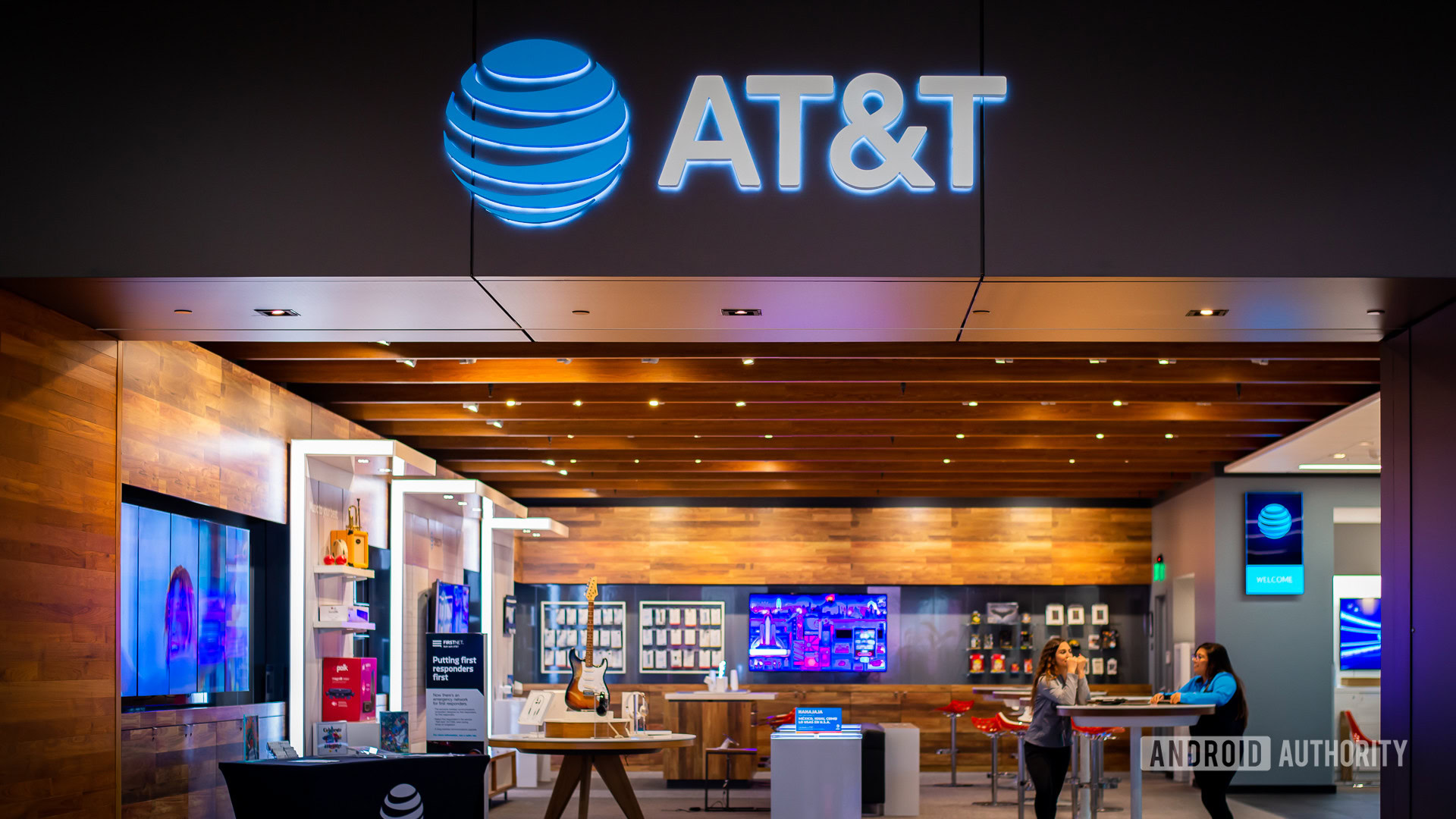Affiliate links on Android Authority may earn us a commission. Learn more.
AT&T in trouble? Seems to be playing it safe in 2023

The US mobile landscape has evolved significantly over the years. Not long ago, Verizon and AT&T were the leading players, with Sprint and T-Mobile following at a distance. In 2023, the gap between the major carriers has narrowed considerably, and the competition is fiercer than ever. Earlier this summer, AT&T’s stock hit a 30-year low, raising the question: Is AT&T in trouble?
Now, I’m not suggesting that the company is in danger of disappearing. It remains a Fortune 500 company with a substantial subscriber count and a loyal fan base. It’s also important to note that Verizon isn’t exactly thriving either, dealing with similar lead contamination issues and other factors affecting its stock prices. Whatmore, according to Statista AT&T is actually doing quite well in terms of retaining subscribers. After a few months of slight decline, it’s actually seen some minor growth over the last two quarters.
Nevertheless, I’ve noticed a recent shift in how the public, and its investors, perceive AT&T.
AT&T and Verizon have traditionally been on par in terms of pricing and innovation, and that’s not necessarily a compliment. While they still boast strong, extensive networks, Verizon seems to be actively exploring new strategies to improve its fortunes, while AT&T appears less inclined to do so.
Verizon has long held a reputation for being the most expensive carrier, but that’s becoming less true in 2023. In fact, the introduction of the My Plan structure has seen Verizon’s pricing dip slightly below AT&T’s.
While the My Plan structure may not be the most family-friendly, both T-Mobile and Verizon have reduced their pricing. Granted, with the price drop, some extras like free perks have been sacrificed. Conversely, AT&T has also cut back on its perks, yet its pricing remains noticeably higher. In fact, most of AT&T’s plans are approximately $10 more expensive than their Verizon counterparts. The gap isn’t quite as big for T-Mobile, but it’s plans still begin around $5 less, while typically offering more features.
To get an idea of how pricing and features compare, we picked a plan from each carrier that we think represents the best deal for most consumers:
| Cost | Talk, Text, and Data | Hotspot | International service | Extra Perks | |
|---|---|---|---|---|---|
Verizon MyPlan Plus | Cost $65 for one line $55 for two lines $40 for three lines $30 for four lines | Talk, Text, and Data Unlimited talk, text, and data 4G/ 5G Nationwide 5G Wideband 30GB premium data | Hotspot 30GB hotspot access | International service Talk & Text in Mexico and Canada Texting in over 200 countries | Extra Perks 720p streaming Can add perks for $10 each, including 100GB hotspot data, Apple Music, Apple One, Disney Plus bundle, and more |
T-Mobile Magenta | Cost Prices per line: $70 for one line $60 for two lines $47 for three lines $40 for four lines | Talk, Text, and Data Unlimited talk, text, and data 4G/5G with 100GB premium data | Hotspot 15GB premium high-speed access, unlimited 3G speeds | International service Unlimited talk, text, and 5GB data in Mexico and Canada Texting in 215+ countries 5G of data and unlimited talk/text in 11 additional countries | Extra Perks 480p streaming default, 720p available in settings 6 months trial of Apple TV Plus 2 year device financing (vs 3 years for AT&T and Verizon) |
AT&T Unlimited Extra | Cost $75 for one line $65 for two lines $50 for three lines $40 for four lines | Talk, Text, and Data Unlimited talk, text, and data 4G/5G with 50GB premium data | Hotspot 15GB premium high-speed access | International service Unlimited texting to 120 countries Free access in Mexico and Canada | Extra Perks 480p streaming |
AT&T just seems to be playing it safe … and boring

AT&T has decent plans, and when you factor in taxes and other fees, the pricing gap isn’t necessarily as big as it might seem on paper. It’s still very real, though. The bigger issue is that the company seems to be playing it safe. Safety can come off as boring. I feel like I’m constantly hearing about new plans and upgraded features for T-Mobile and Verizon. Sometimes these plans are met with negative reception, but people are still talking about them.
AT&T seems to be the quiet player in this race, just doing what it does without making much fuss. The thing is, the quiet one gets forgotten. The one exception is commercials. I do see a lot of AT&T commercials, but these seem more focused on trade-in deals and not on actively convincing us to make the switch.
It just feels like AT&T could be making bigger and bolder moves. This is especially true with T-Mobile arguably transforming into “just another carrier.” Its recent moves seem to put it further and further away from its older image as the cool kid. Granted, it still manages to set itself apart in a few ways, like sticking to two-year payment plans when the rest of the big players are moving to a three-year model.
It is time for AT&T to make a bold move and show people that it’s still here and that the doom-and-gloom directed at it isn’t justified. How could it do this? Better plan pricing is a good start. Improved advertising that highlights the significant changes it’s making could also go a long way.
AT&T seems to have a management problem

I would argue that management is an even larger issue here. Some of AT&T’s acquisitions have been questionable and have detracted from its focus on its mobile network. And yes, part of that criticism is directed at DirecTV. The significant investments in fiber are undoubtedly important for AT&T, but they shouldn’t come at the detriment of its mobile efforts. For example, the C-Band rollout has been incredibly slow.
It’s not just about questionable investments and a lack of a “cool factor.” Employee morale seems to be somewhat of an issue as well. I’m not referring solely to layoffs, as that has affected T-Mobile and Verizon too. Nevertheless, a quick look at online sources like The Layoff or Reddit reveals hundreds of stories from employees who feel they are treated poorly by the upper management tier.
AT&T needs to shake its (somewhat unfair) image, and new management could go a long way here.
I’ve also heard several stories about employees being forced to relocate and experiencing significant increases in the cost of living with no real additional compensation. This is causing many of them to quit, potentially leaving behind a workforce that is more inclined to comply with management’s decisions as opposed to thinking outside the box.
AT&T’s management structure needs a shakeup. Perhaps it could take a page out of T-Mobile’s former playbook and present itself as the fun company that thinks differently. Of course, John Stankey is no John Legere.
AT&T could also benefit from changes to its plans and pricing. I spoke to a few friends who were former AT&T subscribers, including Android Authority‘s Edgar Cervantes. I mostly heard the same justifications for leaving: pricing and coverage. For example, Ed left because he had great coverage from AT&T and benefited from free roaming in Mexico when he lived in San Diego. However, after a move to Los Angeles, he found that AT&T performed poorly in his neighborhood. Switching to Google Fi gave him better coverage while saving him money.
It’s not all dire: AT&T still has its strengths

It’s entirely possible that AT&T has a deeper strategy behind its massive fiber investments and other recent moves. Perhaps it’s a long-term play, similar to Microsoft’s evolving Xbox strategy over the years. Microsoft made numerous acquisitions with a focus on PC, streaming, and console hardware. These moves, initially seen as unconventional by some, are now arguably starting to pay off. That’s a separate discussion, but it underscores the point that there may be a more extended plan in play here.
The good news is that AT&T isn’t without merit. As highlighted before, it’s not really losing subscribers and is more treading water if anything. So from a financial standpoint, it’s really not doing bad at all. It’s more of a reputation and perception issue.
I spent a lot of time talking to friends and family who are current AT&T customers, and I also conducted extensive research beyond this discussion (read: I mostly surfed Reddit). The vast majority of AT&T subscribers I spoke with support the network. Most agreed that it was on the expensive side, but they felt it was one of the best options in their current area. The comments I read online further backed this line of thinking. AT&T tends to exist in many underserved areas of the country, and where it works, it works exceptionally well.
AT&T isn't in trouble — yet. It does need to show us it's still in this fight though.
Another common sentiment was that AT&T’s network might not be as fast as T-Mobile or Verizon, but it offered superior consistency. I will be the first to say Verizon can either be amazing or barely functional, depending on the city I find myself in. I’ve heard similar complaints from T-Mobile customers. It appears that AT&T can handle network congestion better than most, focusing on reliability over speed.
This brings me back to my earlier point: Why doesn’t AT&T make a stronger case for this? They should advertise it! Many customers are willing to forgo the absolute fastest speeds in favor of an experience that consistently works as expected.
When I started brainstorming this opinion piece, I was convinced AT&T was burning faster than the flames could extinguish. However, after delving deeper into research and speaking with current and former users, my perspective has shifted.
AT&T isn’t in trouble, but it does stand at a crossroads. The decisions it makes in the next few years may very well determine its final place in the carrier race. It will also determine if it will continue to hold on to subscribers or slowly lose them as the competition continues with price cuts and other competitive moves.
As things stand, I believe that T-Mobile and Verizon may overshadow it in time. Though perhaps AT&T will always remain silently successful, even if not exactly exciting. The key takeaway is that it’s not too late for AT&T to change its perception. There’s a lot of potential here; the company just needs to leverage that foundation and push harder with bolder marketing moves to keep itself relevant. Who knows, maybe AT&T will end up surprising all its detractors in the end.